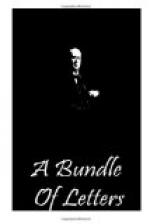The great thing is to live, you know—to feel, to be conscious of one’s possibilities; not to pass through life mechanically and insensibly, like a letter through the post-office. There are times, my dear Harvard, when I feel as if I were really capable of everything—capable de tout, as they say here—of the greatest excesses as well as the greatest heroism. Oh, to be able to say that one has lived—qu’on a vecu, as they say here—that idea exercises an indefinable attraction for me. You will, perhaps, reply, it is easy to say it; but the thing is to make people believe you! And, then, I don’t want any second-hand, spurious sensations; I want the knowledge that leaves a trace—that leaves strange scars and stains and reveries behind it! But I am afraid I shock you, perhaps even frighten you.
If you repeat my remarks to any of the West Cedar Street circle, be sure you tone them down as your discretion will suggest. For yourself; you will know that I have always had an intense desire to see something of real French life. You are acquainted with my great sympathy with the French; with my natural tendency to enter into the French way of looking at life. I sympathise with the artistic temperament; I remember you used sometimes to hint to me that you thought my own temperament too artistic. I don’t think that in Boston there is any real sympathy with the artistic temperament; we tend to make everything a matter of right and wrong. And in Boston one can’t live—on ne peut pas vivre, as they say here. I don’t mean one can’t reside—for a great many people manage that; but one can’t live aesthetically—I may almost venture to say, sensuously. This is why I have always been so much drawn to the French, who are so aesthetic, so sensuous. I am so sorry that Theophile Gautier has passed away; I should have liked so much to go and see him, and tell him all that I owe him. He was living when I was here before; but, you know, at that time I was travelling with the Johnsons, who are not aesthetic, and who used to make me feel rather ashamed of my artistic temperament. If I had gone to see the great apostle of beauty, I should have had to go clandestinely—en cachette, as they say here; and that is not my nature; I like to do everything frankly, freely, naivement, au grand jour. That is the great thing—to be free, to be frank, to be naif. Doesn’t Matthew Arnold say that somewhere—or is it Swinburne, or Pater?
When I was with the Johnsons everything was superficial; and, as regards life, everything was brought down to the question of right and wrong. They were too didactic; art should never be didactic; and what is life but an art? Pater has said that so well, somewhere. With the Johnsons I am afraid I lost many opportunities; the tone was gray and cottony, I might almost say woolly. But now, as I tell you, I have determined to take right hold for myself; to look right into European life, and judge it without Johnsonian prejudices. I have taken up my residence in a French family, in a real Parisian house. You see I have the courage of my opinions; I don’t shrink from carrying out my theory that the great thing is to live.




